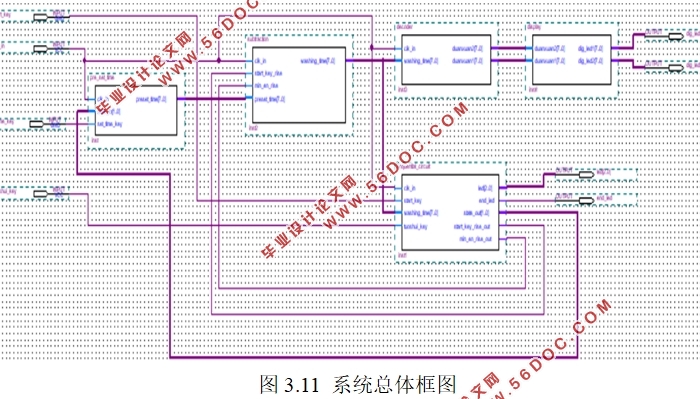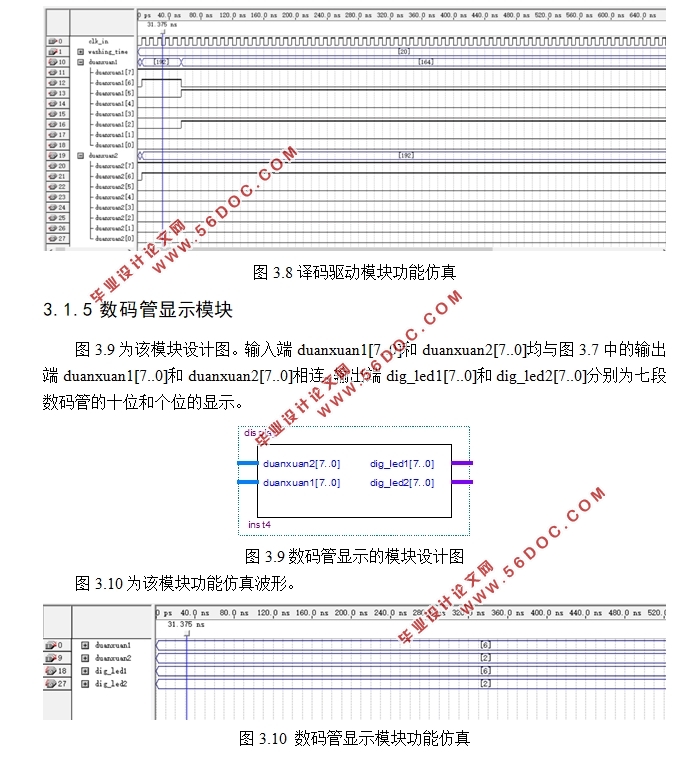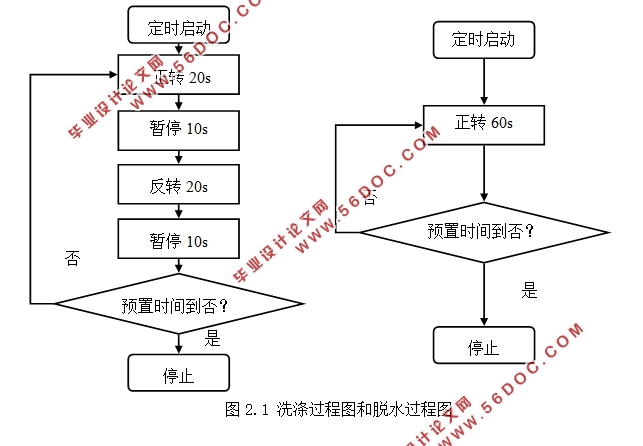基于FPGA的洗衣机控制器设计(VHDL)(任务书,开题报告,外文翻译,论文说明书12000字)
摘 要
19世纪中期,世界上首台洗衣机被美国人史密斯所研制成功,它的发明代表着人类从此告别了手工洗衣的繁重劳动。时至今日,洗衣机的发展已经经历了一个多世纪。国内外,有关于洗衣机的研究也在一直发展。这些年来,因为科学技术不断增强、工业化大规模进驻日常生活和生活质量的不断提高,消费者对洗衣机功能和设计上的需求在不断加大,人们对更为先进的洗衣机的出现期待程度日益增高。对于洗衣机的控制器这一洗衣机设计中的核心,它应达到具有较高自动化程度、日常使用方便、且在控制器控制过程中尽量降低误差等设计要求。本论文主要研究对象为基于FPGA洗衣机控制器,电机的正转、反转运行和暂停、停止状态是由硬件描述语言VHDL描述,七段数码显示电路用于显示洗衣机的运行时间和运行状态。洗衣机控制器由五个子模块构成。本设计基于QuartusII软件,运用EDA平台进行设计,编写VHDL硬件描述语言来描述各个子模块功能,各子模块分别进行功能仿真,总程序进行时序仿真。
本论文充分利用FPGA的特点,提出了自己的设计方案和思路,并使得洗衣机控制器不仅能完成指定功能,还具有抗干扰能力强且易于调试的特点。该控制器解决了传统的洗衣机机械控制的问题,实现了洗衣机的正常运作。
关键词:洗衣机控制器;VHDL语言;现场可编程门阵列;QuartusII软件
Abstract
In the mid-nineteenth century, the world's first washing machine was successfully developed by Smith, an American. Its invention represents a farewell to the heavy labor of manual washing. Today, the development of washing machine has gone through more than a century. At home and abroad, the research on washing machine has been developing. Over the years, with the continuous enhancement of science and technology, large-scale industrialization in daily life and the continuous improvement of quality of life, consumers'demand for the function and design of washing machines is increasing, and people's expectations for the emergence of more advanced washing machines are increasing. For the controller of the washing machine, which is the core of the design of the washing machine, it achieves the design requirements of high automation, convenient daily use and minimizing errors in the control process of the controller. The main research object of this paper is a washing machine controller based on FPGA. The forward and reverse operation, pause and stop states of the motor are described by VHDL, and seven-segment digital display circuit is used to display the running time and state of the washing machine. The controller of washing machine consists of five sub-modules. This design is based on Quartus II software and EDA platform. VHDL hardware description language is compiled to describe the functions of each sub-module. Each sub-module is simulated separately, and the general program is simulated sequentially.
This paper makes full use of the characteristics of the FPGA, puts forward its own design scheme and ideas, and makes the washing machine controller not only complete the specified functions, but also has strong anti-interference ability and easy to debug. The controller solves the problem of traditional washing machine mechanic control and realizes the normal operation of washing machine.
Key Words:Washing Machine Controller; VHDL Language; Field Programmable Gate Array; Quartus II Software
本文主要内容
本论文一共包含三章。第一章介绍了基于FPGA洗衣机控制器设计的背景及意义,分析了设计目的和主体思路,并描述了目前洗衣机控制器设计的研究现状以及发展前景。第二章介绍了设计方案具体的实现方法,包括方案选择,硬件系统构思,总结逻辑时序以及五个子模块设计:预置时间寄存电路模块设计、十进制减法计数模块设计、时序电路模块设计、译码器驱动电路模块设计和数码管显示模块设计。第三章介绍了各子模块程序代码及功能仿真,洗衣机控制器的系统程序框图以及总体时序仿真与分析。




目录
第1章 绪论 1
1.1 背景及意义 1
1.2 研究目的和主体思路 2
1.2.1 研究目的 2
1.2.2 主体思路 2
1.3 研究现状和发展趋势 3
1.4 本文主要内容 3
第2章 设计方案和思路 4
2.1 设计方案 4
2.2 EDA技术 4
2.3 FPGA 5
2.4 Quartus II 5
2.5 VHDL语言 6
2.6 设计思路 7
2.7 子模块的设计思路 8
2.7.1 预置时间寄存电路模块 8
2.7.2 十进制减法计数器模块 8
2.7.3 时序电路模块 9
2.7.4 译码驱动模块 10
2.7.5 数码管显示模块 10
第3章 程序设计及仿真 12
3.1 各子模块程序设计及仿真 12
3.1.1 洗涤预置时间编码寄存电路模块 12
3.1.2 十进制减法计数器模块 13
3.1.3 时序电路模块 14
3.1.4 译码驱动模块 14
3.1.5 数码管显示模块 15
3.2 洗衣机控制器系统框图及仿真 16
第4章 结论与展望 17
4.1 心得体会与结论 17
4.2 我的展望 18
参考文献 19
附录 20
致谢 25
|









